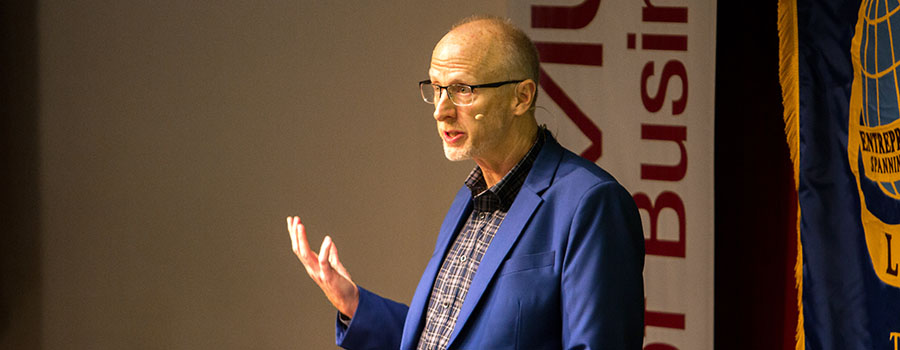
Chet Pipkin is more than a tech guy. He’s a people guy. As founder, chairman and CEO of Belkin International, Pipkin has built a technology empire based on a people-centric approach to innovations and passion for delightful user experiences. He may not be as well-known as Steve Jobs yet he’s considered one of the most successful entrepreneurs and innovators of his time.
Pipkin spoke on the evening of Oct. 19 as part of the Hilton Distinguished Entrepreneur Lecture Series, organized by the LMU Fred Kiesner Center for Entrepreneurship. Throughout his talk, he encouraged the audience to think about passions of their own.
Pipkin’s own passion for identifying and solving unmet customers’ needs led to founding Belkin in his parents’ garage in Hawthorne, Calif. in 1983. He hopped aboard the PC train and hasn’t looked back since. He began with $1,500 in savings and a $25,000 loan from his parents. Pipkin says there were many times when it looked like the company was going to fail yet he always found a way to keep going.
“I didn’t know anything when I started out,” said Pipkin. “I had to learn the basics of business and all the key components of the customer service industry. What I did know is that I wanted to help people.”
Fast forward to today and Silicon Beach-based Belkin International operates under four distinct brands – Belkin, Linksys, WeMo and Phyn. There’s a 90% chance that the smartphone you’re using has a Belkin product in it somewhere. Similar to Steve Jobs, Pipkin has a real appreciation for people and design. He also has a keen sense of what products will and won’t work in today’s marketplace.
“Think about where there’s an awful lot of demand and capacity and where technology can bridge that gap,” said Pipkin. “Exciting things can happen when demand and capacity meet.”
One of the first problems he solved was allowing customers to print with Apple fonts even if they didn’t own an Apple product.
In his talk, Pipkin highlighted a few new innovations that Belkin is working on, including a phone charger pad, a Wi-Fi home system and an intelligent home water system that measures water usage from the shower vs. sink vs. dishwasher.
“The future is all about smart cities and how data can be created by people that gets aggregated in a bigger way,” said Pipkin.
So what’s Pipkin’s advice to aspiring entrepreneurs who have an idea but don’t know where to start? “Just go for it!”



